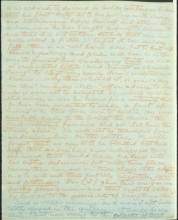Page 6
was ordered to do; and he holds his tongue because it is his first duty. As to his posing with Hume, and attitudinizing before himself and others as a seer, since he has brought himself to believe it, and that it is but certain details that can be really called a fiction, or to put it less mildly fibs — there is no real harm done but to himself. Hume's jealousy and pride will ever be in the way, to prevent him swallowing truth as much as ornamental fiction; and Sinnett is shrewd enough to sift very easily Fern's realities and dreams. . . . Why then, should I, or you or any one else" concludes M. — "offer advice to one who is sure not to accept it, or, which will be still worse, in case he learns for a certainty that he has been permitted to make a fool of himself — is still more sure to become an irreconcilable enemy to the Society, the Cause, the much suffering Foundersand all. Let him, then, strictly alone. . . . He will not be thankful for undeceiving him. On the contrary. He will forget that no one is to be blamed but himself; that no one had ever whispered him one word that could have led him into his extra delusions; but will turn more fiercely than ever on those chaps — the adepts and he will call them publicly impostors, jesuits and pretenders. You (I) gave him one genuine pucka phenomenon — and that ought to satisfy him as to the possibility of everything else."
Such is M.'s reasoning; and were I not indirectly mixed in the quiproquo — it would be also mine. But now, owing to the plants of that



pucka or pukka means genuine, or highly regarded.
qui pro quo is used to define a misunderstanding or blunder made by the substituting of one thing for another, particularly in the context of the transcribing of a text.